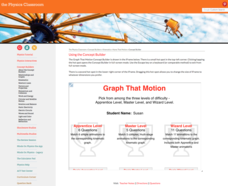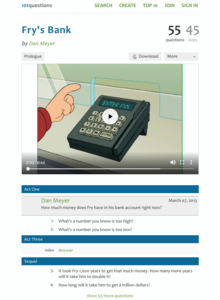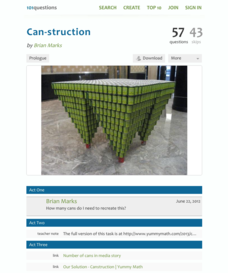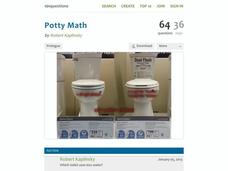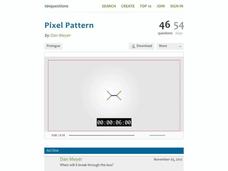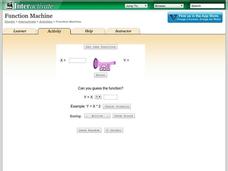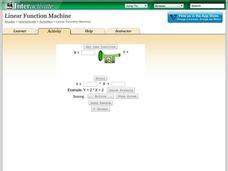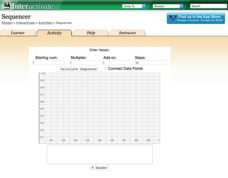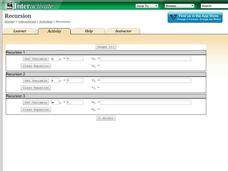Physics Classroom
Graph That Motion
Pupils apply their knowledge of the shape and slope of graphs to interpret the motion of an object. Three levels of difficulty provide plenty of practice with support thanks to the "Help Me!" button offered with each question.
101 Questions
Lunch
Traditional lamian, a noodle originating from China, is hand shaped by twisting, stretching, and folding the dough into strands. Scholars observe the technique before determining the length of the final noodle. They use exponential...
101 Questions
Fry's Bank
If money was left in an interest-earning account for 1,000 years, how much would it increase? Viewers watch a clip from a show about the future when someone learns about their balance after 1,000 years. Then, they solve for the amount in...
101 Questions
Snow Day
Who doesn't like a snow day? Learners watch a snow accumulation over a span of 10 hours. They use that information to make a prediction of the total snow that fell during the 23-hour snowfall. Will it be enough to cancel school?
101 Questions
Can-struction
Can you solve it?! A New York City art challenge involves making sculptures from cans. The task is to determine the number of cans used in the engineering award-winning sculpture. Scholars consider the patterns in the different layers to...
101 Questions
Domino Skyscraper
Can a domino knock over a skyscraper? An inquiry-based lesson asks learners to calculate the size of domino needed to topple the Empire State Building. Using specific criteria and a geometric model, they find a solution.
101 Questions
Potty Math
You don't want to flush your money down the drain! Have your classes complete a financial comparison between two different types of toilets. They use linear modeling to determine the most cost-effective model.
101 Questions
The Incredible Shrinking Dollar
Make money disappear! Young scholars watch as a copier shrinks a dollar bill to 75 percent of its size. Learners are left to determine the size of the dollar bill after nine passes through the copier.
101 Questions
Pixel Pattern
Any vintage video game users in the room? Young scholars use a video presentation to analyze patterns in pixel arrangements. By writing an arithmetic sequence, they make predictions about the size of the image.
Shodor Education Foundation
Function Machine
Machines can be so helpful sometimes. A simple interactive has learners enter input values for a function machine and observe output values. These values help determine a function that represents the input-output relationship in the...
Shodor Education Foundation
Multi-Function Data Flyer
Explore different types of functions using an interactive lesson. Learners enter functions and view the accompanying graphs. They can choose to show key features or adjust the scale of the graph.
Shodor Education Foundation
Linear Inequalities
An interactive lesson helps individuals learn to graph inequalities in two variables. Scholars can adjust the interactive to present the inequalities in standard or slope-intercept form.
Shodor Education Foundation
Linear Function Machine
What goes in must come out! Learners play with a function machine to determine the correct function. They enter input values and watch as the machine produces the output.
Shodor Education Foundation
Sequencer
Take the first step into graphing sequences. Learners set the starting number, multiplier, add-on, and the number of steps for a sequence. Using the inputs, the interactive calculates and plots the sequence on the coordinate plane. Users...
Shodor Education Foundation
Recursion
Perform the operation ... and then do it again. Scholars investigate recursive formulas by creating and graphing them. Using the interactive, pupils set the variable, determine the initial value, and type in a recursive formula.The...
Mathematics Assessment Project
Representing Functions of Everyday Situations
Functions help make the world make more sense. Individuals model real-world situations with functions. They match a variety of contexts to different function types to finish a helpful resource.
CPALMS
Writing an Exponential Function from its Graph
Grow an equation for the exponential graph. Given a graph of an exponential function, class members write the equation of the function provided. The graph labels two points on the graph: the y-intercept and the point where x is one.
CK-12 Foundation
Function Rules based on Graphs: Making Money in the Hat Business
Hats off to those learning about the graphs of functions. Individuals use an interactive to plot points representing profits for a hat business. They identify a quadratic equation to represent this function and answer challenge questions...
CK-12 Foundation
Graphs Using Slope-Intercept Form: Zip-Line
Zip lines aren't so scary when all your scholars use them for is math. Young mathematicians see how the slope of a zip-line to a building changes as the height changes. They answer a set of challenge questions regarding the scenario.
CK-12 Foundation
Forms of Linear Equations: Equation Exploration
Different forms, same line. Young mathematicians investigate the standard form, slope-intercept form, and point-slope form of a linear equation. An interactive has them adjust lines on a coordinate plane to see changes in each form of...
CK-12 Foundation
Slope-Intercept Form of Linear Equations: Cable Car Tracks
Get on track to learn about slope-intercept form. Scholars use an interactive to position a line along the tracks of cable car. Applying knowledge of slope and intercepts, they write the slope-intercept form of the equation for the line.
CK-12 Foundation
Standard Form of Linear Equations: Seesaw
Don't hem and haw, learn about equations using a seesaw. An easy-to-use interactive has pupils move a seesaw on a coordinate plane to investigate the standard form of a linear equation. By completing a set of challenge questions, they...
Mathematics Vision Project
Linear and Exponential Functions
Provide a continuous progression to linear and exponential functions. Pupils continue to work with the discrete functions known as sequences to the broader linear and exponential functions. The second unit in a series of nine provides...
Mathematics Vision Project
Module 1: Sequences
Take steps into sequences. An 11-lesson unit builds upon pupils' previous understanding of writing expressions to develop the idea of sequences. The resource explores both arithmetic and geometric sequences using recursive and explicit...


